Personal tools
News from ICTP 109 - Monitor

The Village Centre
ICTP is more than a centre. In fact, it's more like a village.
And one of the offices that play a critical role in the Centre's
'village' is the Housing Office.

"Our office is part hotel, part rental agency, part hospitality
centre and part events planner," explains Dora Photiou,
who has headed the five-person office since 1997. The other members
of the staff are Tiziana Bottazzi, Elisabetta Capello, Stefano
Coglievina and Michela Filippini.
The main function of the Housing Office is managing the availability
of rooms at the Adriatico and Galileo guesthouses, which together
can house about 200 guests each night. The office also has signed
special low-rate agreements with about 30 hotels in Trieste and
the surrounding area to accommodate the overflow of visitors during
peak periods. Office staff also assist in the preparation of about
200 leases a year from a database of 1000 private apartments whose
owners would like to rent to the Centre's long-term visitors,
including ICTP scientific and international administrative staff.
"One of the things we have noticed over the past few years,"
says Bottazzi, the office's senior staff person with more than
10 years' experience, "is that our visitors have become much
more eager to stay at our guesthouses than to be placed in off-campus
hotels."
Photiou notes that "there are two reasons for the increased
interest in on-campus housing."
"First, over the past five years, the Centre has invested
a good deal of money in upgrading its housing facilities. We have
added ceiling fans, refrigerators and internet connections to
every room-and all rooms that had three beds now have two, providing
additional privacy."
"Second, over the past two years, there has been a sharp
increase in the number of hosted activities taking place at ICTP.
While the participants are not officially part of the Centre's
research and training activities and while the costs for these
events is covered by the hosts, these visitors nevertheless often
ask to stay in our guesthouses."
The result has been that the number of overnight guests rose from
4100 in 2000 to 6100 to 2003. In 2004, it's likely the number
will reach 7000.
In addition to ensuring that ICTP visitors have a restful place
to stay, the Housing Office also oversees the Centre's cafeterias
and bars, working out the terms of reference and helping select
the private vendors who provide the services. The office also
manages the numerous coffee breaks, buffet luncheons and official
dinners that take place during the conferences and workshops-more
than 800 'hospitality' events each year.
"In 2005," Photiou says, "we plan to improve the
facilities even more by renovating the bathrooms, which are 20
years old, and purchasing new beds (yes, they will be wider) and
new furniture that should give our visitors additional storage
and table-top space."
"Our surveys show that more than 90 percent of our visitors
rate our service either excellent or good," says Bottazzi.
And what is the number-one complaint among the 10 percent of visitors
who say the service is only sufficient? It's roommates who snore.
"We're trying to do something about that as well," Bottazzi
asserts. "The Centre recently purchased several boxes of
ear plugs."
The Photo Centre
ICTP medical officer Sandro Gallucci recently displayed his first-ever photographic exhibition in downtown Trieste. 'Snaps' offered a colourful offbeat perspective--literally snapshots--of the doctor's travels in Italy, France, and Austria. The photographs of Maria-Paz Alessandroni, wife of ICTP Mathematics Group head Le Dung Trang, were shown in the Main Building from 28 April to 21 May. "Mind's Eye" uses infrared film, sepia- and silver-tones, and experimental paint-on-print techniques to produce impressionistic, dreamlike images. Alessandroni, who studied photography at San Mateo County Community College in California, has worked as a photographer and photography teacher in the United States and Europe.
Science for Society
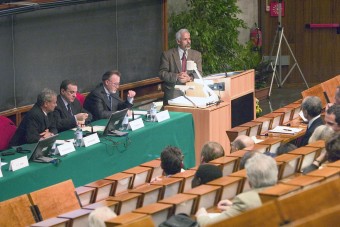
A roundtable discussion on 'Science and Research for Social
and Political Advancement' took place on 7 May in ICTP's Main
Lecture Hall. Co-organised by Lions Club Trieste Host and ICTP,
the event included remarks by Settimio Carlo Aiello, president
of Lions Club Trieste Host; Roberto Antonione, undersecretary
of the Italian Ministry of Foreign Affairs; Roberto Cosolini,
councillor of Regione Friuli-Venezia-Giulia for Labour,
Training, University and Research; Harald Kreid, executive
secretary of the Central European Initiative (CEI); Mario Pines,
vice president of Lions Club Trieste Host; Domenico Romeo,
rector of the University of Trieste; and Katepalli R. Sreenivasan,
director of ICTP.
ICTP Prize Awarded
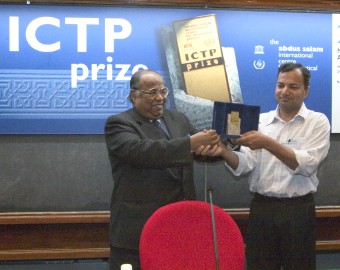
Indian Ambassador to Italy, H. Som and Manindra Agrawal
Manindra Agrawal, winner of the 2003 ICTP Prize, officially
received the award and delivered the ICTP Prize Lecture on 27
May in ICTP's Main Lecture Hall. Agrawal, who is a mathematician
with the Indian Institute of Technology, Kanpur, India, is currently
on leave conducting research at the Institute for Advanced Study
in Princeton, New Jersey, USA. For additional information, see
www.ictp.it and www.cse.iitk.ac.in.
Expo 2008
ICTP director Katepalli R. Sreenivasan spoke before the General Assembly of the International Exhibition Bureau (BIE) in Paris on 23 June. His presentation, drawing on Trieste's proposed theme for Expo 2008, examined the critical role that ICTP and Trieste's other scientific institutions have played in the "mobility of knowledge" over the past four decades. Sreenivasan noted that the mobility of knowledge is not just an intellectual exercise but an effective way to address some of the critical challenges faced by humanity. Trieste is competing with two other cities--Thessaloniki, Greece, and Zaragoza, Spain--to host Expo 2008. BIE will make its final selection in December.
Appointment
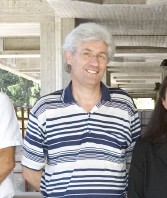
Seifallah Randjbar-Daemi has been named special assistant
to the director, a post that will allow him, among other things,
to serve as "a sounding board for matters concerning the
interface between the Centre and the developing world." In
addition to his new responsibilities, Randjbar-Daemi will continue
to head ICTP's High Energy Physics group.
India-ICTP Connections
Manmohan Singh, India's new Prime Minister who was appointed following the surprise victory of the Congress Party in national elections in May, visited ICTP in 1988 in his capacity as Secretary General of the South Commission to attend a meeting of the South Commission's Working Group on Science and Technology. The South Commission was established in 1987 under the chairmanship of Julius Nyerere, former President of Tanzania and long-time friend of ICTP's Founding Director Abdus Salam.
From Science to Sophia

Sophia Loren in a photo by Massimo Silvano
ICTP's photographer, Massimo Silvano, not only chronicles
the Centre's scientific activities, but has also gained notoriety
as a photographer of boats and ships. In June, he enjoyed an assignment
with an extra bonus when he photographed Sophia Loren who was
'baptising' the world's largest cruise ship, MSC Opera, in Genoa,
Italy. The ship was built by Chantiers de l'Atlantique
in Saint Nazaire, France.
IN MEMORIAM
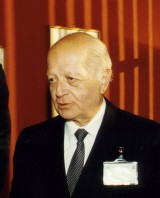
Guido Gerin, a key player in the early history of ICTP, died on 26 April. He was 83. A professor of law at the University of Trieste, Gerin served as the Italian government's representative to the International Atomic Energy Agency (IAEA) in Vienna, Austria, between 1964 and 1974, ICTP's first decade of existence. In the early 1980s, Gerin returned to Trieste to head the Istituto internazionale per i diritti dell'uomo (International Institute for Human Rights), created under the umbrella of the United Nations Educational, Scientific and Cultural Organization (UNESCO). He devoted the latter years of his career to examining the ethical and legal problems associated with genetics research and biotechnology.
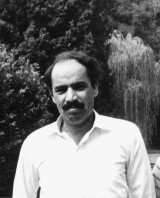
Noor Mohammad, an ICTP postdoctoral fellow 1987-1989,
Associate 1990-1995, and frequent visitor, died on 13 April. He
was two days shy of his 53rd birthday. Born in Raniwah, Pakistan,
Noor Mohammad received his undergraduate and master's degrees
in mathematics from Islamabad University (later to be renamed
Quaid-i-Azam University) during the 1970s. He then taught at the
Federal Government College in Islamabad for a brief period before
receiving a scholarship to attend Moscow University, former USSR,
where he earned a doctorate in mathematics in 1983. He subsequently
returned to Quaid-i-Azam University where he remained for nearly
two decades. A noted scholar in functional analysis, Noor Mohammad
published more than 30 articles in refereed international journals
during the course of his career.